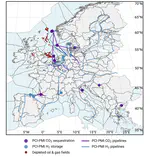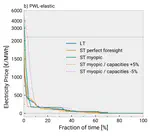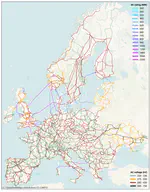Postdoc researcher
ENSYS @ TU Berlin
Welcome! I am a research scientist specializing in energy economics, energy policy, operations research, and programmable matter. My work focuses particularly on mathematical models in the energy field—their applications to real-world problems, their limitations, and their impact on decision-making. I believe in the value of open science and try to to contribute by sharing my research code, data, and teaching materials.
Currently, I am a postdoctoral researcher at the Energy Systems group at TU Berlin. The overarching goal of our work is to identify cost-effective pathways to climate neutrality, leveraging quantitative methods to inform policy and public discourse.
Beyond work, I enjoy astrophotography, reading about space exploration, new discoveries, and just good sci-fi books.
- Mathematical models
- Modelling for insight
- Operations research
- Energy economics
- Energy policy
PhD in Energy Economics, 2022
Brandenburg University of Technology
MSc in Power Engineering, 2014
Brandenburg University of Technology
BSc in Power Engineering, 2012
ZSEA Ukraine
Experience
Since early 2022, I joined the ENSYS @ TU Berlin group as a research scientist. We use methods from operations research and mathematical optimization researching the most cost-effective pathways to reduce greenhouse gas emissions in energy systems. Our group maintains the PyPSA ecosystem - an open-source python environment for state-of-the-art energy system modelling.
I work on the RESILIENT research project, funded by public grants, to advance our capabilities in planning energy systems with resilience at their core. This project builds upon the existing PyPSA-Eur model, enhancing its features and extending it with stochastic modeling capabilities. Our mission is to develop the first truly multi-vector, open-source energy infrastructure planning model that can handle the complexities and uncertainties defining modern energy systems.
From 2022 to 2025, a significant part of my work was dedicated to the 24/7 Carbon-Free Energy by 2030 project in collaboration with Google. This initiative aims to advance the transition to round-the-clock carbon-free electricity. The project webpage—247cfe.github.io—documents the full history of our work. This research work was fully open and reproducible, with all developments available on GitHub: github.com/PyPSA/247-cfe.
Aside my research, I contribute to the Green Deal Ukraїna project that aims to set up a Think Tank that will provide modelling-based support for Ukrainian governmental institutions, policymakers, and society in rebuilding the Ukrainian economy and energy sector during and after this terrible war.
In the period of end 2014 - early 2022, I was a research fellow at the Chair of Energy Economics at Brandenburg University of Technology. I have carried out research on energy economics and energy systems modeling. The topics included infrastructure investments, decisions under uncertainty, robust planning of energy systems, risk-aversion, sector coupling and energy auctions.
In this period, I completed my PhD in energy economics (Summa cum laude) under supervision of Prof. Felix Müsgens. My cumulative thesis is titled ‘Modeling challenges of modern energy markets: studies on uncertainty, complexity, and constant change’ and is published in open access.
My PhD supervisor and I developed a study course at BTU, named ‘Energy systems modelling’. The class focuses on the intersection of energy economics, operations research and energy modelling. The course gets usually very warm feedback from students. Some of the teaching materials are available on the GitHub repository.
In Autumn 2019, I did a research stay in the University of Victoria, Canada, where I worked with Prof. Madeleine McPherson. My work there focused on robust optimization algorithms applied to electricity system expansion problems. Victoria BC is simply a fantastic place.
Research
papers | preprints | code | data
Talks
slides | code | records
Media
science explainers | opinion pieces
Space
space | pet projects | misc







